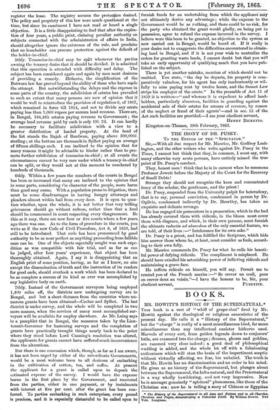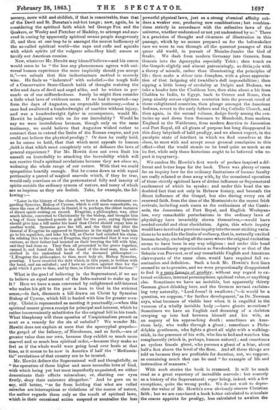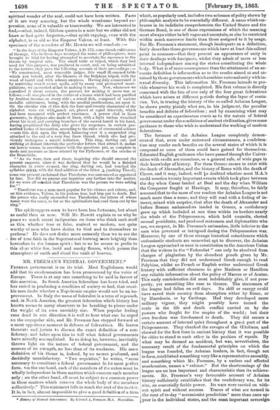BOOKS.
MR. HOWITT'S HISTORY OF THE SUPERNATURAL.* THIS book is a sort of " whiff of grape-shot" fired by Mr. Howitt against the theological or religious sansculottes of the present day. He calls it a "History of the Supernatural," but the " charge " is really of a most miscellaneous kind, far more miscellaneous than any intellectual canister hitherto used. Marvels of every sort, from golden legends down to conjurors' balls, are crammed into the charge ; dreams, ghosts and goblins, are rammed very close indeed ; a good deal of philosophical wadding is added, and the whole let off with a fulminating enthusiasm which will stun the brain of the impertinent sceptic without virtually affecting, we fear, his unbelief. The truth is that Mr. Howitt has no discrimination and no order in his mind. He gives us no history of the Supernatural, but plunges about between the Supernatural, the Infra-natural, and the Preternatural in a way wholly bewildering, and not very impressive. Now he is amongst genuinely " spiritual" phenomena, like those of the Christian era; now he is telling a story of Chinese or Egyptian
• The History pf the liapernatwai in all dyes and Nations and is all Churches, Chcallan and Pagan, demonstrating a Universal Fai4lc By William Howitt. Two Vole. Longman.
sorcery, more wild and childish, if that is conceivable, than that of the Devil and St. Dunstan's red-hot tongs ; now, again, he is considering the spiritual faith which led George Fox and the Quakers, or Wesley and Fletcher of Madeley, to attempt and suc- ceed in curing by apparently spiritual means people dangerously ill, and then at one leap he is amongst the merest buffoonery of the so-called spiritual world—the raps and cuffs and squeaks with which spirits (of the vulgarer schoolboy kind) amuse or terrify our American cousins.
Now, whatever Mr. Howitt may himself believe—and his canon would seem to be " the less any phenomenon agrees with uni- versal human experience the more implicitly should you accept it,"—we submit that this indiscriminate method is scarcely wise. He finds us "indurated" with unbelief,—the tough hide of a Conservative State-Church habit of thought resisting the wiles and darts of devil and angel alike, and he wishes to per- suade us of our stiffneckedness. Surely he might then consider a little what laws of evidence mean. If we had it reported—say from the days of Augustus, on respectable testimony,—that a man had swallowed a hundredweight of marbles without injury, and was a hundredweight lighter in consequence, would Mr.
Howitt be indignant with us for our incredulity ? Would he say we were incredulous because, though only on the same testimony, we could believe that Augustus wished rather to contract than to extend the limits of the Roman empire, and yet could not believe the physical prodigy ? Or does he really hold, as he seems to hold, that that which most appeals to human faith is that which most completely sets at defiance the laws of general experience ? For Mr. Howitt does not even limit his assault on incredulity to attacking the incredulity which will not receive God's spiritual revelations because they are above us, widening the whole range of our nature. With that we could sympathize heartily enough. But he crams down us with equal pertinacity a parcel of magical marvels which, if they be true, would only convince us of the preternatural folly and inanity of spirits outside the ordinary system of nature, and many of which are as impious as they are foolish. Take, for example, the fol- lowing :—
" Later in the history of the church, we have a similar statement re- garding Synesius, Bishop of Cyrene, which is still more remarkable, as, since the case of Belshazzar, in Daniel, it is, perhaps, the oldest instance of direct spirit-writing on record. Evagrius, a philosopher, was, after much labour, converted to Christianity by the bishop, and brought him a bag of three hundred pounds in gold for the poor, saying Synesins should give him a bill under his hand that Christ should repay him in another world. Synesius gave the bill, and the third day after the funeral of Evagrius he appeared to Synesius in the night and bade him go to his sepulchre, and take his bill, as Christ had satisfied his claim. On relating this to the sons of Evagrius, they remarked that it was very curious, as their father had insisted on their burying the bill with him, and they had done so. They then all proceeded to the grave together, opened it, and found the bill in the hand of the dead man, thus sub- scribed in the undoubted hand of the deceased philosopher :— I, Evagrius the philosopher, to thee, most holy sir, Bishop Synesius, greeting. I have received the debt which, in this paper, is written with thy hand, and am satisfied ; and I have no action against thee for the gold which I gave to thee, and by thee, to Christ our God and Saviour.' " What is the good of believing in the Supernatural, if we are to believe an equal amount of the Infra-natural to make up for it? Here we have a man converted by enlightened self-interest
who makes his gift to the poor a loan to God in the strictest sense,—in fact, discounts a bill drawn on Christ by Synesius Bishop of Cyrene, which bill is buried with him for greater secu- rity. Christ is represented as meeting it punctually,—when this spiritual usurer gives a receipt for principal and interest, which he rather inconveniently substitutes for the original bill in his tomb. What blasphemy will these apostles of Unspiritualism preach us next as a remedy for the sin of unbelief ? We wonder Mr.
Howitt does not explain at once that the apocryphal gospels— the gospel of the Infancy, of Nicodemus, and so forth,—are of greater value than our own, because they exhibit so much more marvel and so much less spiritual order,—because they make us feel as if the whole world were going head over heels at that time, as it seems to be now in America if half the " Mediumis- tic" revelations of that country are to be trusted.
Mr. Hewitt defines the Supernatural well and thoughtfully, as " the operation of those higher and more recondite laws of God, with which being yet but most imperfectly acquainted, we either denominate their effects miraculous, or, shutting our eyes firmly, deny their existence altogether." And he goes on to say, still better, "so far from holding that what are called miracles are interruptions or violations of the course of nature, the author regards them only as the result of spiritual laws, which in their occasional action suspend or neutralize the less powerful physical laws, just as a strong chemical affinity sub- dues a weaker one, producing new combinations ; but combina- tions strictly in accordance with the collective laws of the universe, whether understood or not yet understood by us." There is a precision of thought and clearness of illustration in this passage, which by no means prepared us for the helterskelter race we were to run through all the queerest passages of this queer old world, in pursuit of Mumbo-Jumbo the God of freaks. We dash from modern Germany into Genesis, from Genesis into the Apocrypha especially Tobit ; then touch on the Gospels slightly and almost patronizingly, as fitting-in with a theory of miracle, rather than illuminating the principles of life ; then make a de'tour into Josephus, with a pious apprecia- tion of that fatiguing old twaddler's dull impossibilities ; then sipping a little honey of credulity at Delphi and Dodona, we take a header into the Chaldean lore, then skim about a bit from Chaldea to India, to Egypt, back to Greece and Rome, then jump nimbly across eighteen centuries into the present creed of these enlightened countries, then plunge amongst the American Indians, revert to the early fathers and the Catholic Church, and then again, in the second volume, dodge freely among the cen- turies up and down from Sozomeu to Humboldt, from modern England to the Waldenses, from modern America to Jansenism and Port Royal, till all gleam of purpose has long disappeared in this dizzy labyrinth of bald prodigy, and we almost expect, in the paralytic state of intellect in which we find ourselves at the close, to meet with and accept some general conclusion to this effect—that the world stands on its head quite as much as on its feet, while only those historians ought to be believed who re- port it topsyturvy.
We confess Mr. Howitt's first words of' preface inspired a dif- ferent and better hope for the book. There was plenty of room for an inquiry how far the ordinary limitations of human faculty are really relaxed or done away with, by the occasional operation of those strictly spiritual laws of divine influence or Supernatural excitement of which, he speaks ; and under this head the un- doubted fact that not only in Hebrew history, and beneath the direct influence of the Gospel, but also during every era of renewed faith, from the time of the Montanists to the recent Irish revivals, including such cases as the enthusiasm of the Camis- ards, the Jansenism of Port Royal, and English Wesleyan- ism, very remarkable perturbations in the ordinary laws of physiology have invariably shown themselves,—would have needed careful and clear elucidation. Again, this whole inquiry would have involved a previous inquiry into the most striking varia- tions to be noted in the limits of ordinary, that is, naturally excited human faculty, excluding all the cases where the original excitation seems to have been in any way religious : and under this head such extraordinary organizations as Swedenborg's or that of the Seherin von Prevorst, or of any remarkable English and American clairvoyants of the same class, would have required full ex- amination and definition. Such a book Mr. Howitt's first lines seemed to us to promise, and we were proportionally disappointed to find it aj_letle.farra,so_ of prodigy, without any regard to ex- ternal evidence, internal presumptions, spiritual value, or anything else. Sometimes we have an invisible, but apparently thirsty German ghost drinking beer, and the German servant exclaim- ing very naturally, "Lord Jesus! it swallows ;"—it would be a question, we suppose, " for further development," as Dr. Newman says, what becomes of visible beer when it is engulfed in the vacuum of a wholly invisible body ;—have ghosts secretions ? Sometimes we have an English earl dreaming of a skeleton creeping up into bed between himself and his wife, as an augury of his approaching death ; sometimes an Ame- rican lady, who walks through a ghost ;_ sometimes a Phila- delphia gentleman, who fights a ghost all night with a walking- stick, in the presence of his wife, who lies in bed and watches him complacently (which is, perhaps, human nature) ; and sometimes an eyeless female ghost, who pursues a ghost of a friar, about half a foot above the level of the floor. And all these things are told us because they are profitable for doctrine, not, we suppose, as containing much that can be used " for example of life and instruction of manners."
With such stories the book is crammed. It will be much read as a great repertory of incredible marvels ; but scarcely as a history of the Supernatural; super being, indeed, with a few exceptions, quite the wrong prefix. We do not wish to depre- ciate the value of Mr. Howitt's own obviously sincere Christian
faith ; but we are convinced a book better calculated to stimulate the coarse appetite for prodigy, less calculated to awaken the
spiritual wonder of the soul, could not have been written. Parts of it are very amusing, but the whole wearisome beyond ex- pression, none of it valuable or trustworthy. We are interested to find,—what, indeed, Gibbon quotes in a note but we either did not know or had quite forgottere—that spirit-rapping, even with the alphabet, is as old as the Emperor Valens, at least. With this specimen of the anecdote of Mr. Howitt we will conclude e-
" In the days of the Emperor Valens, A.D. 173, some Greek cultivators of theurgy, who in those days ursurped the name of philosophers, were brought to trial for having attempted to ascertain the successor to the throne by magical arts. The small table or tripod, which they had used for this purpose, was produced in court, and, on being submitted to the torture, they gave the following account of their proceedings : — We constructed, most venerable judges, this small ill-omened table which you behold, after the likeness of the Delphian tripod, with the wood of laurel and with solemn auspices. Havinr, duly consecrated it by muttering over it secret spells, and by many and protracted mani- pulations, we succeeded at last in making it move. Now, whenever we consulted it about secrets, the process for making it move was as follows :—It was placed in the centre of a house which had been purified by Arabian incense on every side ; a round dish, composed of various metallic substances, being, with the needful purifications, set upon it. On the circular rim of this dish the four-and-twenty characters of the alphabet were cut with_much art, placed at equal intervals, which had been measured with perfect exactness. A person clad in linen garments, in slippers also made of linen, with a light turban wreathed about his head, and carrying branches of the sacred laurel in his hand, having propitiated the deity who gives the responses, in certain pre- scribed forms of invocation, according to the rules of ceremonial science —sets this dish upon the tripod, balancing over it a suspended ring attached to the end of a very fine linen thread, which also had pre- viously undergone a mystic initiation. This ring, darting out, and striking at distant intervals the particular letters that attract it, makes out heroic verses, in accordance with the questions put, as complete in mode and measure as those uttered by the Pythoness, or the oracles of the Branchidm.
" As we were, then and there, inquiring who should succeed the present emperor, since it was declared that he would be a finished character in every respect, the ring, darting out, had touched the syllables 0E0, with the final addition of the letter .1 (making Theod),
some one present exclaimed that Theodorus was announced as appointed by fate. Nor did we pursue our inquiries any farther into the matter, for we were all satisfied that Theodorus was the person we were asking for." ' " Theodorus was a man most popular for his virtues and talents, and, on this evidence, Valens, in his jealous fear, had him put to death. But the person who really succeeded was Theodosius, the letters of whose name were the same, so far as the spiritualists had read them out by the ring."
The spirit-rappers-seem to have been less fortunate, but about as useful then as now. Will Mr. Howitt explain to us why he pours so much moral indignation on those who think such stuff as this, whether true or false, ancient or modern, not quite worthy of men who have duties -to God and to themselves to perform ? He does not desire more earnestly than we to see the • fire of true faith in the Supernatural burning more brightly than heretofore in the human spirit ; but to us he seems to prefer to this clear white fire, lurid and smoky flames, which poison the atmosphere of earth and cloud the vault of heaven.
































 Previous page
Previous page